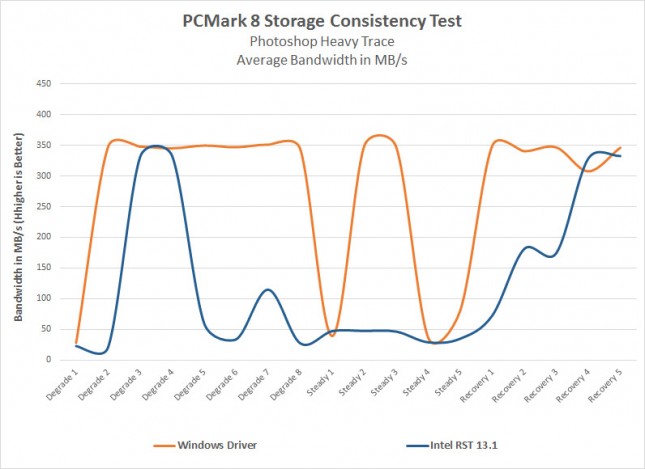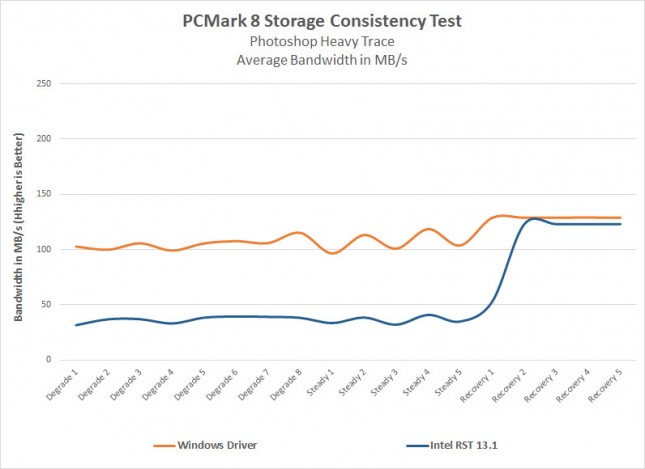Kingston SSDNow V310 960GB SSD Review
PCMark 8 Consistency Test
Something new we are starting to do is run the storage consistency test in the PCMark 8 application from Futuremark. In short, it looks at drive performance degradation as the drive becomes “dirty” and how it rebounds after given time to recover and run background routines like garbage collection and TRIM. This takes nearly a day to run through all of the iterations of test sets. Since most of our benchmarks show the drive performance in a clean state, this is a nice contrast to provide yet another view of performance. PCMark 8’s storage benchmark test contains workload traces from Adobe Photoshop, Adobe Illustrator, Adobe InDesign, Adobe After Effects, Microsoft Word, Microsoft Excel, Microsoft Power Point, World of Warcraft and Battlefield 3.
The PCMark 8 Consistency test has five phases:
Precondition phase
- Write the drive sequentially through up to the reported capacity with random data.
- Write it through a second time (to take care of overprovisioning).
Degradation phase
- Run writes of random size between 8*512 and 2048*512 bytes on random offsets for 10 minutes.
- Run performance test (one pass only). The result is stored in secondary results with name prefix degrade_result_X where X is a counter.
- Repeat 1 and 2 for 8 times and on each pass increase the duration of random writes by 5 minutes
Steady state phase
- Run writes of random size between 8*512 and 2048*512 bytes on random offsets for final duration achieved in degradation phase.
- Run performance test (one pass only). The result is stored in secondary results with name prefix steady_result_X where X is a counter.
- Repeat 1 and 2 for 5 times.
Recovery phase
- Idle for 5 minutes.
- Run performance test (one pass only). The result is stored in secondary result with name recovery_result_X where X is a counter.
- Repeat 1 and 2 for 5 times.
Clean up
- Write the drive sequentially through up to the reported capacity with zero data.

Benchmark Results: We normally compare a drive to the dozen or so SSDs that we have tested with the PCMark 8 storage consistency test, but this time around we won’t be doing that. The Kingston SSDNow V310 960GB SSD had some very strange benchmark results that we can’t really explain. The PCMark 8 Storage Consistency test takes around 20 hours to run and we ran it twice with the Intel Rapid Storage Technology (RST) Version 13.1 drivers and twice with the standard storage drivers that come with Windows 8.1. We found some some pretty strange test results with the Intel RST 13.1 drivers, but from the looks of it we were running around 20-30 MB/s in the degraded states, around 40-50MB/s in the steady states and then seeing the drive slowly recovery up to 350MB/s.
We contacted Futuremark and showed them these results and the strongly recommended using Intel RST drivers for testing as the drivers built into Windows are known to give strange results from time to time. They have forwarded the results to the programmer of the test though and we’ll report back what he/she has to say. The person we talked to had not run the PCMark 8 Consistency test on a 1TB drive before, so we are wondering the there is enough time in the degradation phase for the write section of the test to properly degrade the entire drive.
We also contacted Kingston and showed them the test results, but they don’t currently run the PCM8 consistency test in their labs in North America or Asia. They are planning on taking a look at the PCM8 consistency test on the V310 960GB drive with SATA analyzer on it to see what is happening on the I/O level during the benchmark run.

Benchmark Results: When looking at the Battlefield 3 gaming test trace we found results that were more in-line with what we expected to see. We were seeing right around 38MB/s performance in a degraded state, 38-52MB/s in the steady-state tests and then a small bump up in performance to around 123MB/s when in the recovery phases with time for TRIM and garbage collection to work.
